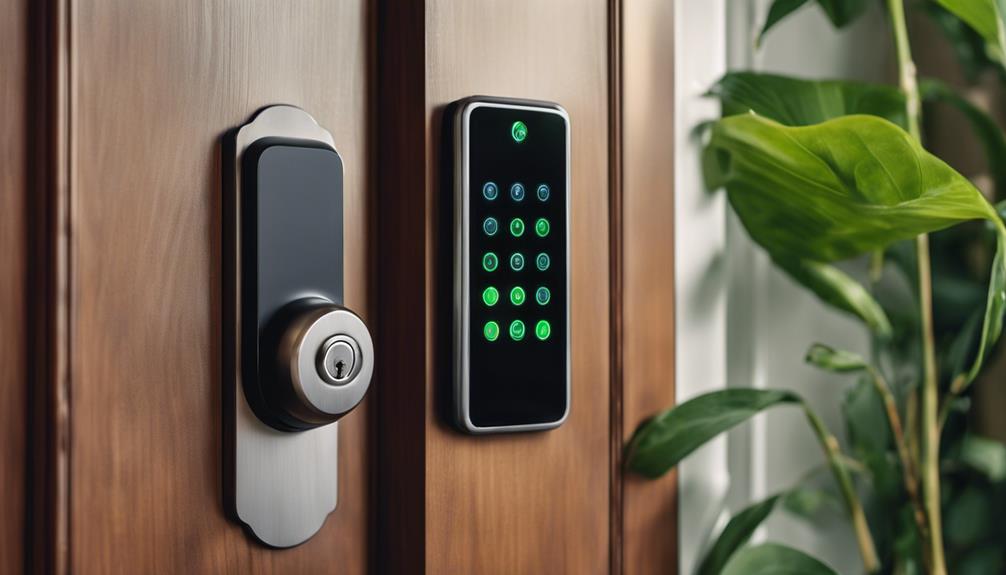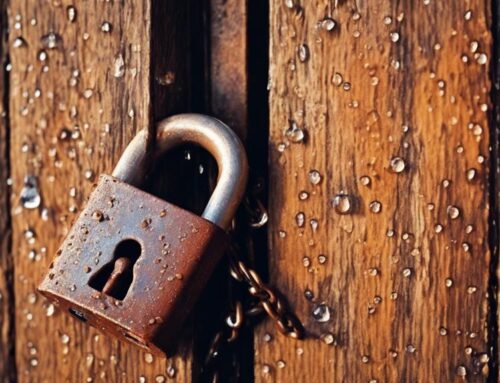Smart locks can enhance your home security while offering unmatched convenience. You can easily control access from your smartphone, grant temporary codes to visitors, and monitor who comes and goes. However, consider the potential downsides, like hacking risks and reliance on Wi-Fi and battery power. If you value modern features and flexibility, smart locks might suit your lifestyle well. On the other hand, traditional locks are simpler and potentially more reliable in emergencies. Assess your security needs and preferences before deciding. There's much more to explore about smart locks and their impact on your home security.
Key Takeaways
- Smart locks offer convenience with keyless entry and remote access, making it easier to manage home security.
- Enhanced security features, like two-factor authentication and activity monitoring, provide added protection against unauthorized access.
- Installation requires basic tools and may need compatibility checks with existing traditional locks for optimal function.
- Consider the potential drawbacks, such as hacking vulnerabilities and reliance on Wi-Fi and batteries, before choosing a smart lock.
- Evaluate your lifestyle and security needs to determine if the advanced features of smart locks align with your preferences.
Overview of Smart Locks
As technology continues to evolve, smart locks have emerged as a convenient and secure alternative to traditional locking systems. These innovative devices utilize smart lock technology to simplify home access while enhancing security. You can control them remotely via smartphone apps, allowing you to grant access to guests, service providers, or family members without needing to be physically present.
Additionally, understanding the differences between re-keying and reprogramming can further enhance your experience with smart locks, ensuring that you can maintain ideal security as your needs change.
However, it's crucial to weigh the pros and cons of smart locks. On the positive side, they offer flexibility and ease of use. You can easily change access codes or lock and release your door from anywhere, which can be especially helpful when serving others. Imagine being able to let in a neighbor to collect your mail while you're away!
On the downside, smart locks can be vulnerable to hacking if not properly secured, and they often rely on battery power, which requires regular checks. Additionally, depending on the brand, there's a potential for compatibility issues with some home automation systems.
Ultimately, understanding both sides will help you make an informed decision about whether smart locks are the right choice for you and those you serve.
Security Features Explained
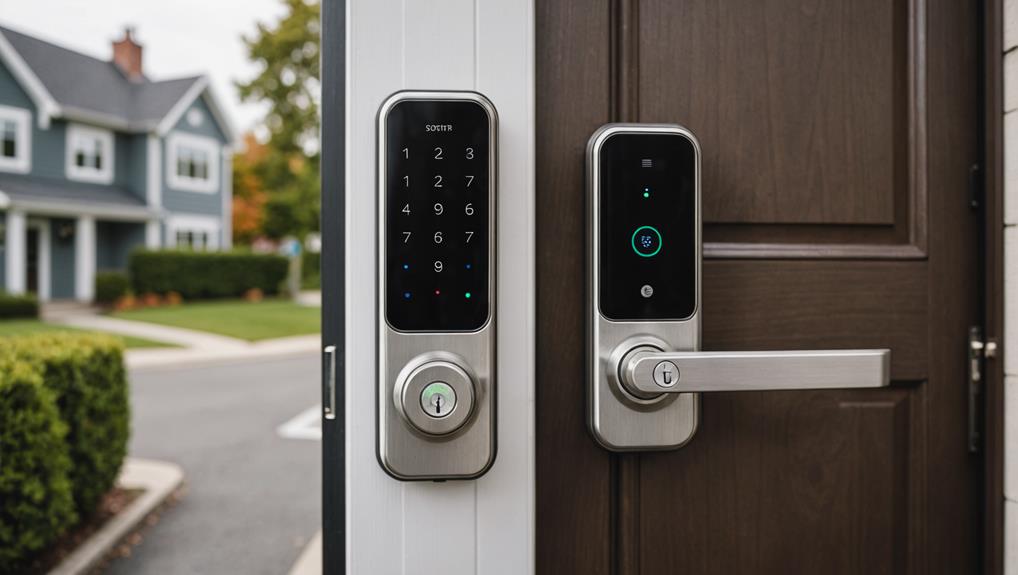
When it comes to smart locks, understanding their security features is vital. One of the key benefits is the ability to manage access remotely, allowing you to control who enters your home even when you're not there.
You'll appreciate the advantages of keyless entry, the convenience of remote access control, and the peace of mind that tamper alerts and notifications provide, as these features greatly enhance home security and user control Smart Locks vs. Traditional.
Let's explore how these features can enhance your home security.
Keyless Entry Advantages
Keyless entry systems have revolutionized home security, offering a seamless way to secure your property without the hassle of traditional keys. These smart lock security features provide several keyless entry advantages, making them an appealing option for those who prioritize convenience and safety.
Here's a quick overview of the benefits you can expect:
| Advantage | Description |
|---|---|
| Enhanced Security | Smart locks use encryption to thwart unauthorized access. |
| Convenience | No more fumbling with keys; just a code or app access. |
| Access Control | You can easily grant or revoke access to visitors. |
| Activity Monitoring | Many smart locks allow you to track who enters and exits. |
With the best smart locks, you can guarantee your home remains secure while enjoying the ease of keyless entry. Whether you're coming home with groceries or hosting guests, these locks simplify your life and enhance your peace of mind. By choosing smart lock security, you're not just investing in convenience; you're also guaranteeing that your loved ones and belongings are protected.
Remote Access Control
Remote access control is one of the standout features of smart locks, making it easier than ever to manage your home's security from anywhere. With a smart lock, you can grant access to family members, friends, or service providers without needing to be there in person. This feature sets smart locks apart from traditional locks, which require physical keys for entry.
So, how do smart locks work? They connect to your home's Wi-Fi or Bluetooth, allowing you to control them through a smartphone app. You can lock or open your door remotely, receive notifications, and even set schedules for when people can enter your home. This level of flexibility is invaluable for those who often serve others, such as caregivers or hosts.
When it comes to smart lock installation, most models are designed for easy setup, often fitting into existing deadbolts.
Whether you're comparing a smart lock vs traditional lock, the remote access capability truly elevates your home security, giving you peace of mind knowing you can monitor and manage access at your fingertips.
Embrace the future of home security with smart locks, and serve others better while ensuring safety.
Tamper Alerts and Notifications
Tamper alerts and notifications are essential security features that enhance the protection offered by smart locks. These features keep you informed about any unauthorized attempts to access your property. When someone tries to tamper with your lock, you'll receive immediate alerts on your smartphone, allowing you to respond quickly.
Imagine the peace of mind you'll have knowing that you're always in the loop. Whether you're at work, on vacation, or simply busy with daily tasks, these notifications guarantee that you can serve others effectively, knowing your home is secure. You can easily alert the authorities if needed, providing them with timely information about potential threats.
Additionally, many smart locks allow you to customize your notifications, so you only receive alerts that matter to you. This way, you can prioritize your responses and focus on what's truly important.
Advantages of Smart Locks
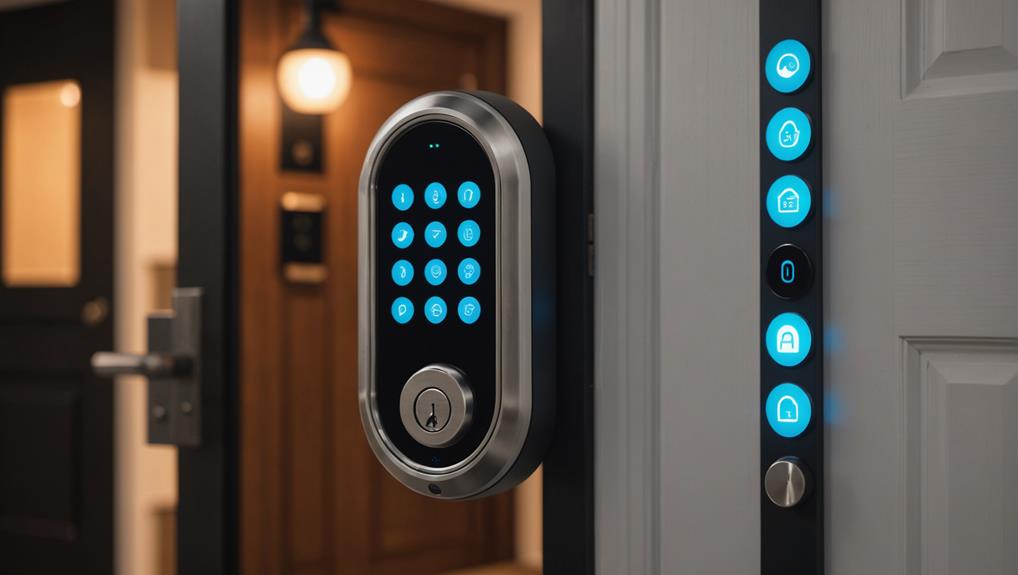
Smart locks offer a range of advantages that can simplify your life. With enhanced security features, remote access convenience, and keyless entry benefits, you can feel more secure and in control.
Additionally, many smart locks are designed to integrate with existing security systems, allowing for a thorough approach to home safety.
For those seeking a balance between traditional and modern security methods, hybrid lock systems may provide an appealing option.
Let's explore how these perks can transform your home security experience.
Enhanced Security Features
Many homeowners are discovering the enhanced security features that smart locks offer, providing peace of mind like never before. These locks not only replace traditional keys but also elevate your home's security with innovative technology.
Here's a quick comparison of some key security features:
| Feature | Description | Benefit |
|---|---|---|
| Auto-Lock | Locks automatically after a set time | Reduces the chance of leaving doors ajar |
| Tamper Alerts | Notifies you if someone tries to tamper | Immediate awareness of potential threats |
| Unique User Codes | Assigns temporary codes for visitors | Keeps your home secure while allowing access |
| Activity Logs | Tracks who enters and exits your home | Increases accountability and safety |
With these features, you can enhance your home's security while serving your family's needs. You'll feel more confident knowing you can monitor access, respond quickly to potential threats, and provide guests with convenient entry without compromising safety. Smart locks aren't just about convenience; they're about creating a secure environment for those you care about most.
Remote Access Convenience
One of the standout advantages of smart locks is the ability to manage access to your home remotely. Imagine you're at work, and a neighbor needs to drop off a package. With smart locks, you can grant them access from anywhere, ensuring they can help you without needing to coordinate a time to meet.
This feature not only adds convenience for you but also fosters community connections by allowing you to assist others easily.
If you're hosting a gathering, you can let friends in without being tied to the front door. You won't have to stop what you're doing or worry about someone waiting outside.
Plus, if a family member forgets their key, you can open the door for them instantly, providing peace of mind.
Remote access also lets you monitor who enters and exits your home, enhancing your ability to serve others with transparency.
You'll know if someone's using the access you provided, and you can revoke it whenever necessary. This flexibility makes smart locks an ideal choice for those who value convenience while ensuring that they can support their loved ones or neighbors effectively.
Keyless Entry Benefits
Convenience reigns supreme with keyless entry, transforming the way you access your home. Imagine never fumbling for keys again, especially when your hands are full. With a smart lock, you can open your door using your smartphone or a simple code, making it easier to welcome friends, family, and service providers without delay.
Security is another significant benefit. Many smart locks offer advanced features like alerts when someone enters your home, allowing you to keep a close eye on who comes and goes. You can even grant temporary access codes to visitors, so they can enter your home without needing a physical key. This makes it perfect for helping others, whether it's a neighbor watering your plants or a delivery driver dropping off a package.
Additionally, keyless entry systems often integrate with home automation, allowing you to control your lock remotely. You can lock or open your door from anywhere, ensuring peace of mind when serving others or when you're away.
With smart locks, you're not just enhancing your own convenience; you're also providing a seamless experience for those you care about.
Disadvantages of Smart Locks
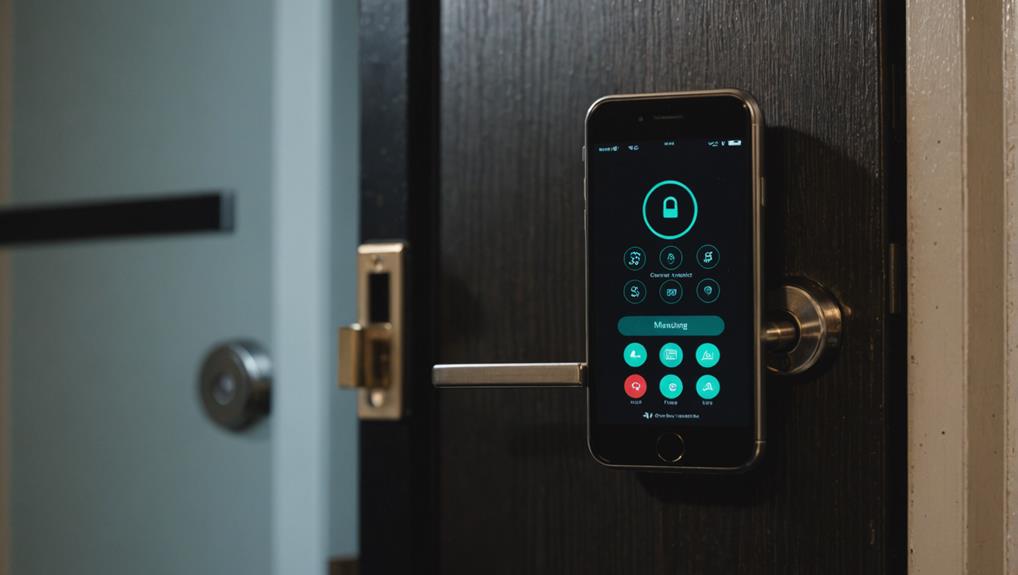
While smart locks offer innovative security features, they come with several significant disadvantages that can't be overlooked.
For instance, traditional locks have established reliability and fewer vulnerabilities, making them a trustworthy option for many homeowners. As you consider whether to invest in one, it's vital to weigh these potential drawbacks carefully.
- Dependence on Technology: Smart locks require a reliable Wi-Fi connection and power supply. If either fails, you could find yourself locked out.
- Vulnerability to Hacking: Cybersecurity threats are real. Smart locks can be hacked, leaving your home at risk if the security measures aren't robust, as highlighted in security features comparison.
- Higher Costs: Initial purchase and installation costs can be steep compared to traditional locks. Ongoing maintenance and potential subscription fees may add to your expenses.
- Limited Mechanical Backup: In case of a malfunction or dead battery, some smart locks offer minimal mechanical backup options, which can be frustrating in emergencies.
Ease of Use
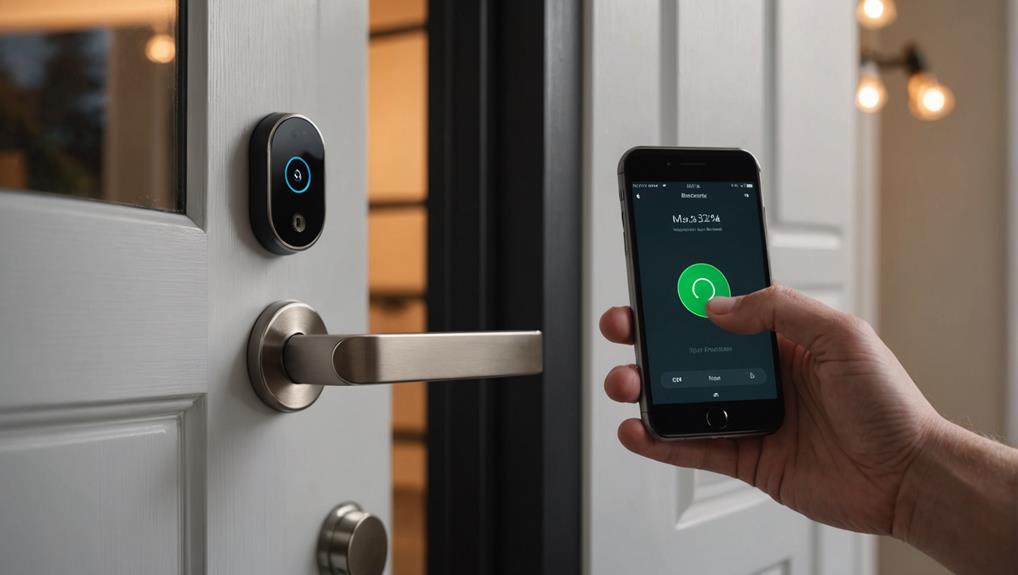
How simple can securing your home be with a smart lock? With just a tap on your smartphone, you can lock or open your door from anywhere, eliminating the hassle of fumbling for keys.
Additionally, while smart locks may have a higher initial cost compared to traditional locks, they can save you money in the long run through reduced maintenance and installation expenses, particularly if you consider cost comparisons associated with both types of locks.
Imagine the ease of letting guests in while you're at work or on vacation, all without needing to be physically present.
Smart locks often come with user-friendly apps that allow you to manage access for family members, friends, or service providers. You can grant temporary codes or digital keys, guaranteeing that your loved ones can come and go without compromising your security.
Plus, many smart locks integrate seamlessly with your existing smart home systems, allowing you to control everything with one app.
You won't have to worry about leaving a spare key under the mat or making duplicate keys. Instead, you can focus on what really matters—serving your family and community.
The convenience of a smart lock makes it easier for you to guarantee that your home is secure while also providing peace of mind to those you care for.
Embrace this technology and enjoy the modern, efficient way to protect your home and those who visit it.
Installation Requirements
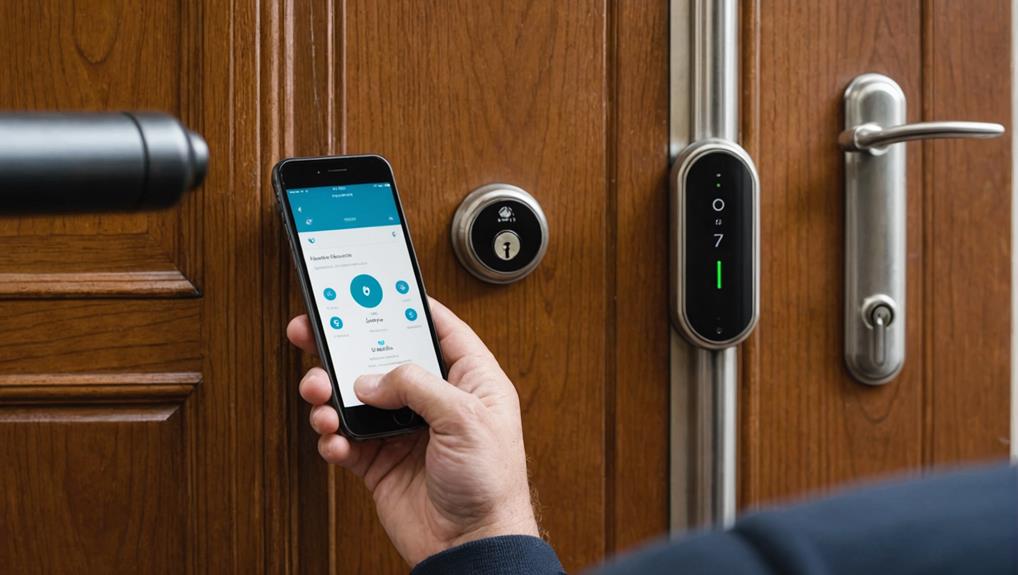
Installing a smart lock can be a straightforward process, but it does require some basic tools and a little know-how.
Before you jump in, it's crucial to gather everything you'll need to guarantee a smooth installation. It's also important to check if your smart lock is compatible with traditional keys as this can affect the re-keying process.
Here's a quick checklist:
- Screwdriver: You'll likely need a Phillips or flathead screwdriver, depending on your lock model.
- Drill: If you're replacing an existing lock, a drill may be necessary to create new holes.
- Measuring tape: Accurate measurements help make certain your new lock fits perfectly.
- Smartphone: Some locks require a smartphone app for setup and configuration.
Once you have your tools ready, follow the instructions provided by the manufacturer. Most smart locks come with clear, easy-to-follow guidelines.
Remember to take your time, especially if you're new to DIY projects. If you encounter any issues, don't hesitate to reach out to customer support or consult online tutorials.
For those interested in enhancing their locking system further, mastering re-keying can be a valuable skill.
With a little patience, you'll be equipped to install your smart lock successfully, enhancing your home's security while serving your family's needs.
Comparing Smart Locks to Traditional Locks
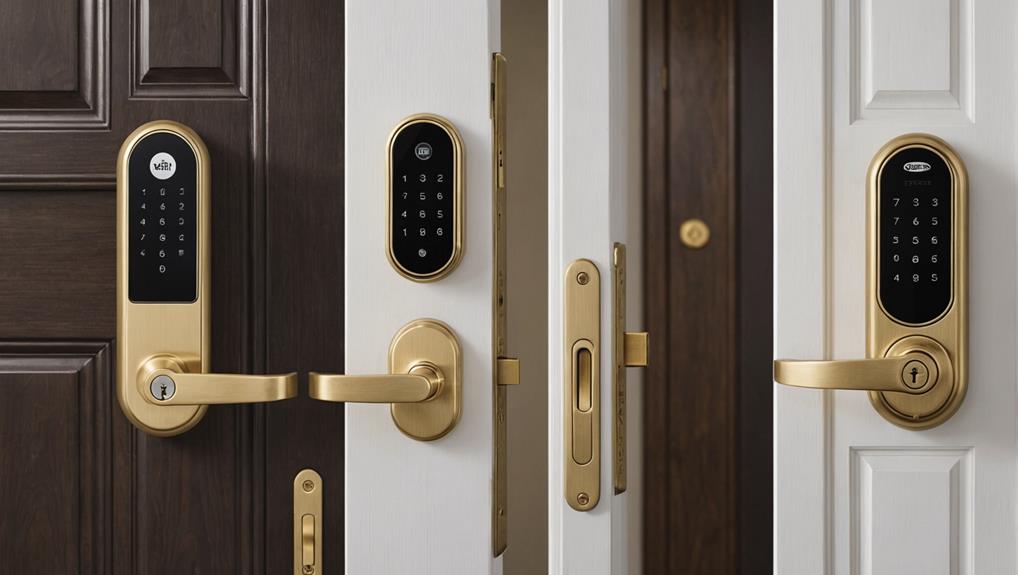
When considering the installation of a smart lock, it's important to weigh the differences between smart locks and traditional locks. Traditional locks rely on a physical key, which can be easily lost or duplicated, posing a security risk. In contrast, smart locks often use electronic keypads or mobile apps, allowing you to grant access without needing a physical key. This can be especially helpful for those who regularly host guests or service providers.
Additionally, many smart locks come equipped with built-in alarms and notifications, enhancing security and providing users with alerts about any unauthorized access attempts user experience insights.
Moreover, smart locks typically offer features like remote access, allowing you to lock or open your door from anywhere. This can provide peace of mind when you're away or if you need to let someone in while you're not home.
Traditional locks, however, lack this level of convenience and control.
On the flip side, traditional locks tend to be simpler and often more reliable in power outages since they don't rely on batteries or Wi-Fi.
If you're serving others, consider your lifestyle and the needs of those you welcome into your home. Understanding these differences will empower you to choose the best locking solution for your situation.
Making the Right Choice
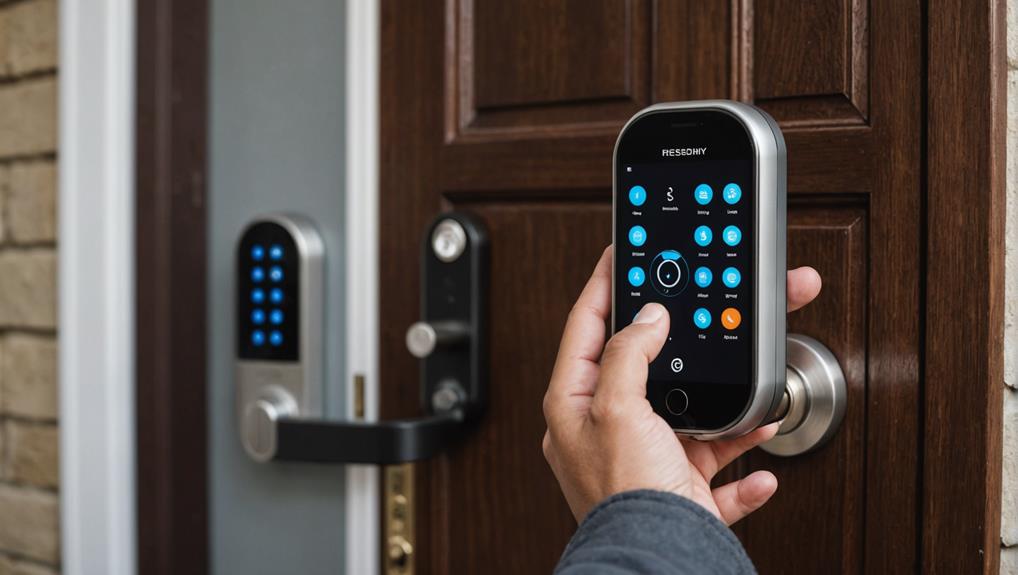
Deciding on the right locking solution for your home involves considering a variety of factors that align with your lifestyle and security needs. Smart locks can offer convenience and enhanced security, but they aren't one-size-fits-all.
According to choosing the perfect lock, evaluating your specific security requirements is essential to making an informed decision. To make the best choice for you and your family, think about these key aspects:
- Ease of Use: How comfortable are you and your loved ones with technology?
- Integration: Does the lock seamlessly work with your existing smart home systems?
- Security Features: Are there advanced features like encryption and two-factor authentication?
- Customer Support: Is there reliable assistance available if you run into issues?
Frequently Asked Questions
Can Smart Locks Work During a Power Outage?
Smart locks typically rely on electricity, so during a power outage, they mightn't function as intended.
However, many models have battery backups that allow you to open your door even when the power's out.
It's crucial to check the specifications of your smart lock to see if it includes this feature.
You'll want to guarantee you can always access your home, even in unexpected situations.
Always have a backup plan in mind!
Are Smart Locks Compatible With Home Automation Systems?
Yes, smart locks can be compatible with various home automation systems.
You'll find many options that integrate seamlessly with platforms like Google Home or Amazon Alexa.
By connecting your smart lock to your home automation system, you can control access remotely, set schedules, and receive notifications.
This integration not only enhances your security but also adds convenience to your daily routine, making it easier for you to manage your home's entry points.
How Often Should I Change My Smart Lock Codes?
Changing your smart lock codes is like revitalizing your favorite recipe; it keeps things exciting and secure.
You should update your codes regularly, ideally every few months or whenever someone leaves your household. If you've had a guest or service person use the code, change it right after.
This practice not only protects your home but also shows you care about the safety of those who visit. Staying proactive guarantees peace of mind for everyone.
What Happens if I Forget My Smart Lock Password?
If you forget your smart lock password, don't panic!
Most smart locks have a backup option, like a physical key or a reset button. You can usually use a companion app on your phone to reset your password.
If you've set up two-factor authentication, that'll help too. Just follow the manufacturer's instructions, and you'll regain access quickly.
Always keep your recovery options updated to avoid future headaches!
Do Smart Locks Require Regular Software Updates?
Yes, smart locks do require regular software updates to guarantee peak performance and security.
These updates often fix bugs, patch vulnerabilities, and introduce new features. You should check for updates frequently, as many smart locks can automatically notify you when an update is available.
Keeping your lock's software up to date helps protect your home and gives you peace of mind, so make it a priority to stay current with those updates.
Conclusion
In summary, smart locks can offer significant benefits, but they're not for everyone. Did you know that 28% of home burglaries involve an unlatched door? This highlights the importance of secure access. If you value convenience and advanced security features, a smart lock might be a great fit for your lifestyle. Just weigh the pros and cons carefully to guarantee it meets your needs. Ultimately, the right choice will enhance your home's security and ease of use.

